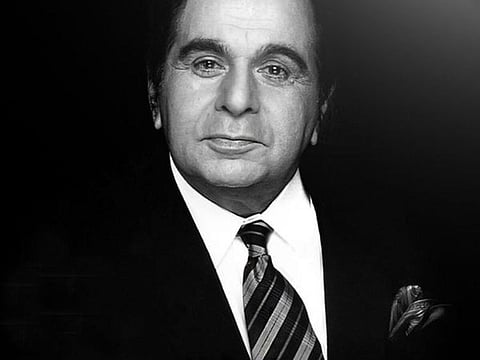From Yusuf Khan to Dilip Kumar, how a Muslim superstar became India’s heart-throb
A legend, who switched his name from Muslim to Hindu and no one blinked an eyelid

Dilip Kumar is dead at 98. The tributes will not stop. He was after all the Marlon Brando of Bollywood. The original Badshah of the Bombay film industry.
Already Prime Minister Narendra Modi is leading the nation in paying eulogy to one of the country's cinematic greats.
Dilip Kumar’s death, will have the sound of fury, much like his very remarkable journey — from the son of a Pathan fruit merchant to a colossus who straddled India’s cultural firmament for close to six decades — and sat atop its high throne.
It was perhaps this fairy tale transformation that captured a nation’s imagination because Dilip Kumar’s story has been — in many ways — the story of India too.
An India, which many today feel, is not the same anymore. Here was a legend, who switched his name from Muslim to Hindu and lo and behold — no one blinked an eyelid.
He was loved, adored, honoured, idolised and exalted in the imagination of a nation.
Keeping his dad’s heart
Born on December 11, 1922 in Peshawar, modern day Pakistan, Dilip Kumar’s real name was Mohammad Yusuf Khan. His strict father, Lala Ghulam Sarwar, frowned upon movies. Little did the old man know that his son was going to become a leading light of one of the world’s biggest film industries.
It was a time when India and Pakistan were one country. Khan’s family moved from Peshawar to Nasik in Maharashtra in the 1930s. He attended school in Deolali. Mumbai, then Bombay, was not too far. Strapping and swashbuckling, he got introduced to a film producer.
The actor adopted the screen name Dilip Kumar, partly not to offend his father, when producer Devika Rani offered him the lead role in the film ‘Jwar Bhata’ in 1944. Filmmakers in that age thought a Hindu screen name might offer Khan more acceptance with the masses, who were majority Hindu.
A star was born
And the rest is history, as they say. The boy from Peshawar never really looked back. He went on to feature in hits like ‘Jugnu’, ‘Shaheed’, ‘Andaz’, ‘Jogan’, ‘Daag’, ‘Aan’, ‘Devdas’, ‘Naya Daur’ and ‘Mughal-e-Azam’. A star was born. At 25, Dilip Kumar was India’s biggest star.
A refined man, he was quite soft-spoken, suave, usually seen in customary bespoke indigo suits and Oxford ties. However, there was one thing he never forgot — his sense of connectedness.
Be it his immediate family of fruit merchants in Bombay’s Crawford Market or his legendary romance with a younger Saira Banu (who remained steadfast by his side till the very end), the thespian stayed close to his folks and audiences.
The love and adulation and social media trends we are witnessing today is an acknowlegment of his decency and artistry. Imagine this: the generation that is trending and tributing him this morning over Twitter, Instagram, Facebook and the like includes millennials and Gen Z. That is the enduring power of cinema.
Widely popular
Dilip Kumar was awarded a whopping 8 Filmfare Awards, in addition to 19 Filmfare nominations. He also received the Dadasaheb Phalke Award and Padma Bhushan Award for his contribution to cinema. Pakistan conferred its highest civilian honour, the Nishan-e-Imtiaz, to Dilip Kumar in 1998.
There is little doubt that he lent the Indian film industry a new identity. It was craft, not glamour, that mattered to the likes of him. Dilip Kumar understood the psychological acuity of the human condition and how to showcase it. In doing so, he made the audiences waltz with him.
He will be buried today at 5pm in Juhu Qabrastan at Santacruz, Mumbai. Artists belong to the world and they are our collective heritage.
In burying Dilip Kumar, a Kohinoor, would be laid to rest. No exaggeration this.
His death is a piercing loss.
Sign up for the Daily Briefing
Get the latest news and updates straight to your inbox










